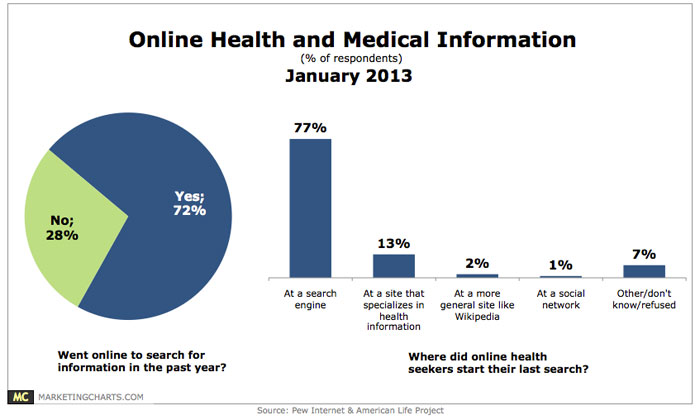72% of US internet users have looked online for health information in the past year. Most search for a specific disease or medical problem (55%) or a certain medical treatment or procedure (43%), according to a Pew Internet & American Life Project survey.
72% of US internet users have looked online for health information in the past year. Most search for a specific disease or medical problem (55%) or a certain medical treatment or procedure (43%), according to a Pew Internet & American Life Project survey.
Among these online health-seekers (who represent 59% of the total US population), 77% started at a search engine the last time they went online to look for health information, while 13% went directly to a site that specializes in health information.
Most popular health websites
In December 2012, WebMD led with 9.6% market share of all US visits, according to Compete data tracked by MarketingCharts. Yahoo! Health was next, with 9% share of visits.
Most popular health searches
Summary of Findings
- For one-third of U.S. adults, the internet is a diagnostic tool
- One in three American adults have gone online to figure out a medical condition
- Eight in 10 online health inquiries start at a search engine
- Half of health information searches are on behalf of someone else
- Specific diseases and treatments continue to dominate people’s online queries
- Women are more likely than men to seek health information online
- Younger adults and minorities lead the way with mobile health information search
- Half of smartphone owners have used their phone to look up health information
- Patients seek counsel from fellow patients and caregivers
- Internet access drives information access
Source ::
The Experian Hitwise data featured above is based on US market share of visits as defined by the IAB, which is the percentage of online traffic to the domain or category, from the Experian Hitwise sample of 10 million US internet users. Experian Hitwise categorizes websites into industries on the basis of subject matter and content, as well as market orientation and competitive context.
image: search/shutterstock
